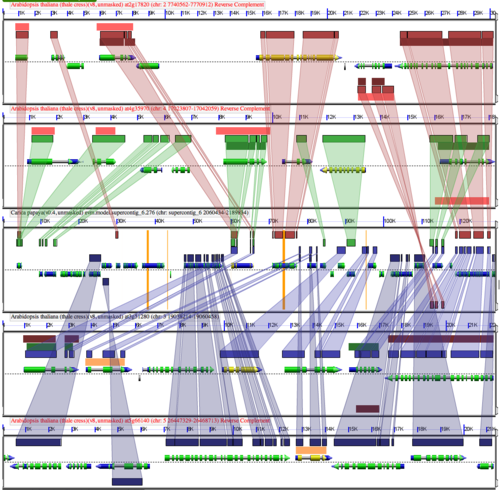Fractionation: Difference between revisions
Jump to navigation
Jump to search
Created page with 'Following whole genome duplication (WGD) events, fractionation is the process of gene loss from one homeologous genomic region or its partner region. Over evolutionary time, thi...' |
No edit summary |
||
| Line 1: | Line 1: | ||
[[Image:At-Cp-Fractionation.png|thumb|right|500px]] | |||
Following whole genome duplication (WGD) events, fractionation is the process of gene loss from one homeologous genomic region or its partner region. Over evolutionary time, this returns a genome to its diploid state in terms of overall gene content. Thus, fractionation is part of the diploidization process. However, the overall structure of the genome will be vastly different as genes are lost from one homeologous region or the other resulting in genes having different neighboring genes. Also, some families of genes are retained preferentially following WGD events. | Following whole genome duplication (WGD) events, fractionation is the process of gene loss from one homeologous genomic region or its partner region. Over evolutionary time, this returns a genome to its diploid state in terms of overall gene content. Thus, fractionation is part of the diploidization process. However, the overall structure of the genome will be vastly different as genes are lost from one homeologous region or the other resulting in genes having different neighboring genes. Also, some families of genes are retained preferentially following WGD events. | ||
Revision as of 23:27, 4 August 2009

Following whole genome duplication (WGD) events, fractionation is the process of gene loss from one homeologous genomic region or its partner region. Over evolutionary time, this returns a genome to its diploid state in terms of overall gene content. Thus, fractionation is part of the diploidization process. However, the overall structure of the genome will be vastly different as genes are lost from one homeologous region or the other resulting in genes having different neighboring genes. Also, some families of genes are retained preferentially following WGD events.